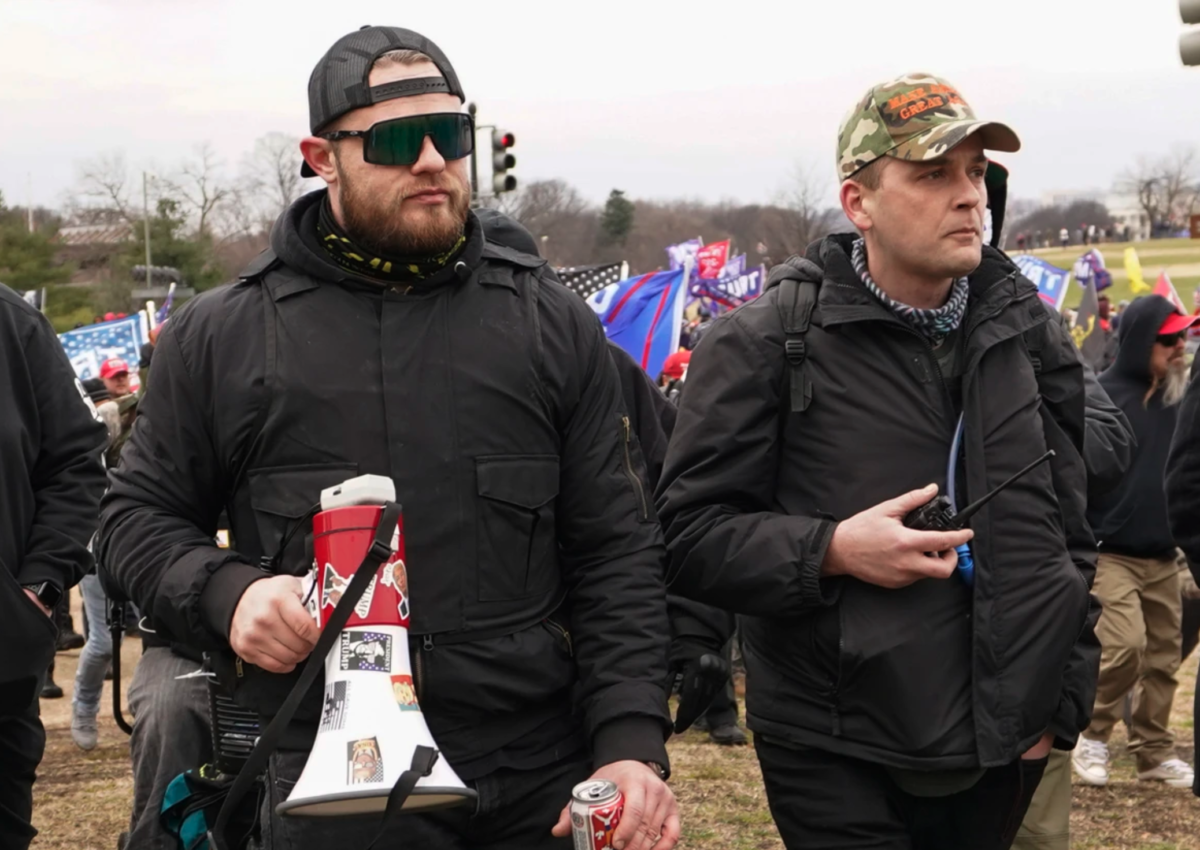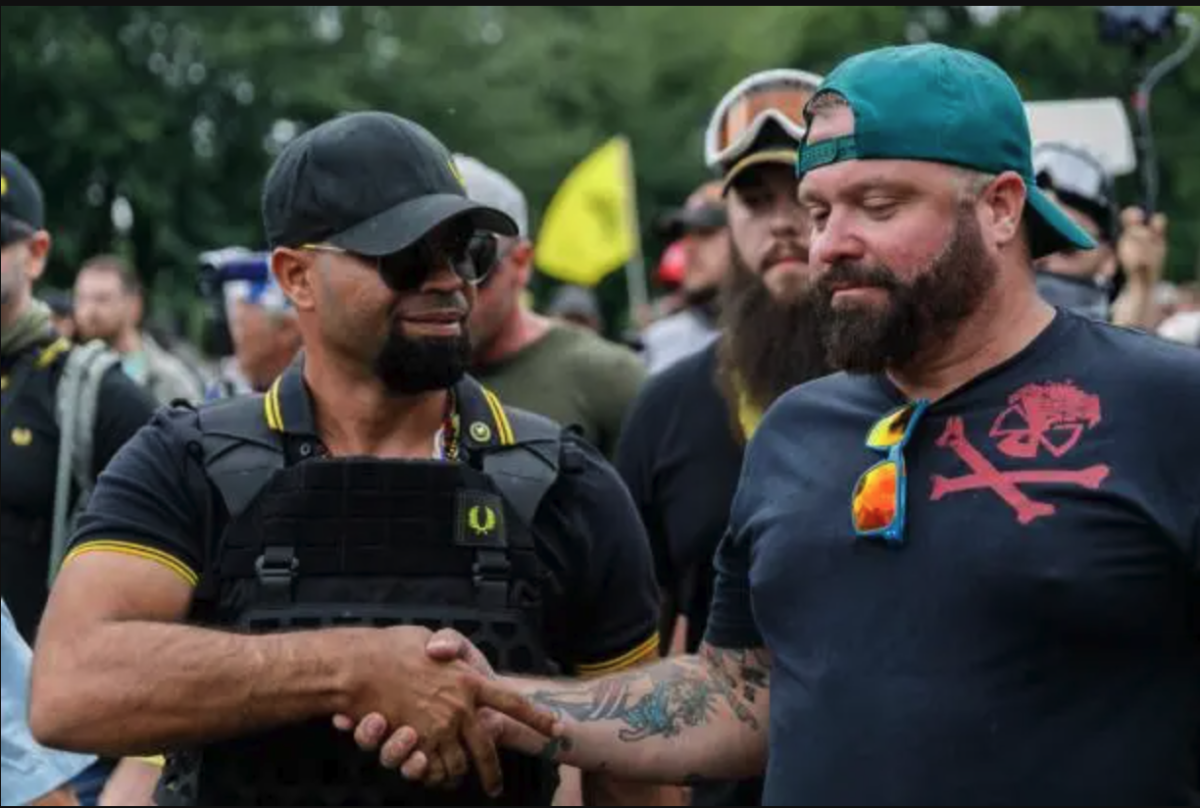Staff Report –
WASHINGTON, D.C. — Two former leaders of the right-wing, pro-Trump Proud Boys organization were sentenced to long prison terms this week for seditious conspiracy and acts of terrorism for their leading roles in the attack on the Capitol on Jan. 6, 2021, which disrupted a joint session of Congress in the process of certifying the electoral votes in the 2020 presidential election and interfering with the peaceful transfer of power in the United States.
Joseph R. Biggs, 39, of Ormond Beach, Florida, was sentenced to 17 years in prison and 36 months of supervised release.
Zachary Rehl, 38, of Philadelphia, Pennsylvania, was sentenced to 15 years in prison and 36 months of supervised release.

Proud Boys members Ethan Nordean, left, and Zachary Rehl walk toward the U.S. Capitol on Jan. 6, 2021: DOJ/NAJ screen shot
A jury convicted Biggs and Rehl and three other co-defendants of multiple felonies, including seditious conspiracy and conspiracy to obstruct an official proceeding on May 4, 2023, for their actions before and during the breach of the Capitol on Jan. 6, 2021.
According to court documents and evidence presented during the trial, the Proud Boys organization played a significant and often violent role in Washington, D.C. rallies in November and December 2020. In the aftermath of that violent conduct, Biggs and Rehl served as members of a special chapter of the Proud Boys known as the “Ministry of Self Defense.”
Beginning after Dec. 19, 2020, Biggs and Rehl, all of whom were leaders or members of the Ministry of Self-Defense, conspired to prevent, hinder, and delay the certification of the Electoral College vote and to oppose by force the authority of the government of the United States, according to a press release from the Department of Justice.
In the days leading to Jan. 6, Biggs, Rehl, and co-defendants Henry “Enrique” Tarrio and Ethan Nordean hand-selected co-defendant Dominic Pezzola and others known as “rally boys” to participate in the attack on the Capitol that day. This group established a chain of command, chose a time and place for their attack, and intentionally recruited others who would follow their top-down leadership and who were prepared to engage in physical violence if necessary.
On Jan. 6, the group and the men they recruited and led participated in every consequential breach at the Capitol. The group began their assault that day at 10 a.m. when Biggs, Rehl, and others marched an assembled group of nearly 200 individuals away from speeches at the Ellipse and directly toward the Capitol.
They arrived at the First Street gate at 12:50 p.m., and Biggs led the crowd in chants of “Whose Capitol? Our Capitol!” and “Whose house? Our house!”
Within minutes, Biggs, Rehl, and others led their recruits up the first street walkway, breaching multiple barricades and tearing down fencing. Biggs then declared, “we’ve gone through every barricade thus far.”
At about 1:30 p.m., when law enforcement appeared to have successfully controlled the crowd by pushing them back, the men again pushed forward with Biggs and other co-defendants leading the charge. Biggs and other co-defendants then gathered at the base of the concrete stairs that led to the doors and windows of the Capitol.
The group again surged toward the Capitol and overwhelmed officers who had been battling the crowd for nearly an hour. Rehl sprayed an officer in the face. One co-defendant, Dominic Pezzola, smashed open a window, allowing the first rioters to enter the Capitol at 2:11 p.m., and Biggs entered close behind him with some of his men.
During the attack, Biggs posed with other Proud Boys on the west lawn of the Capitol for a celebratory video in which Biggs stated that “January 6 will be a day in infamy.” Rehl made social media posts calling January 6 a “historical day,” and told his mother that he was “so f**** proud” of the Proud Boys’ “raid of the capitol.”
Later, Biggs and Rehl made statements regarding their attack on the Capitol. On Jan. 7, Rehl told members of the Ministry of Self-Defense that he was “proud as f*** what we accomplished. Likewise, Biggs recorded a podcast-style interview in which he called January 6 a “warning shot” to the government that showed them “how weak they truly are” after being “b****-slapped . . . on their own home turf.”
Biggs explained that “January 7th was warning shot to the government –look, we started this country this way and we’ll f*****’ save it this way.”
During the hearing, U.S. District Judge Timothy J. Kelly applied the enhancement for a federal crime of terrorism to the defendant’s final sentence.
According to breaking news coverage from the courthouse by the New York Times, Biggs’s sentence was one of the stiffest penalties issued so far in more than 1,100 criminal cases stemming from the Capitol attack and among only a handful to have been legally labeled an act of terrorism.
“It was just over half of the 33 years the government had requested and just shy of the 18-year term given in May to Stewart Rhodes, the leader of another far-right group, the Oath Keepers militia, who was also found guilty of sedition in connection with the attack on the Capitol by a pro-Trump mob.”
The sentences kicked off a series of hearings scheduled for this week and next where the punishment was to be announced against the former chairman of the Proud Boys, Henry “Enrique” Tarrio, and two other members of the group who were convicted of sedition and other serious crimes at a conspiracy trial this spring. Tarrio is scheduled to be sentenced next week.
Hours after sentencing Biggs, Judge Kelly imposed a 15-year sentence on Rehl, who had also been convicted on sedition charges. Prosecutors sought a 30-year term for Rehl.
The Proud Boys — who had been fighting on the streets of Washington since 2017 for a range of far-right causes, often against members of Antifa and let off the hook while the anti-fascist forces were beaten and jailed by DC Metro cops — became a central focus of the FBI’s investigation into what happened on Jan. 6 within days after the Capitol attack.
Aside from Biggs and his co-defendants in the sedition case — Tarrio, Rehl, Ethan Nordean and Dominic Pezzola — more than 20 other members of the group from chapters ranging from New York to Hawaii were ultimately charged in separate indictments.
“The Justice Department’s prosecutions of the Proud Boys all but decapitated the group’s national leadership, which was formally disbanded after the Capitol attack, and mostly put an end to its involvement in large-scale — often violent — pro-Trump rallies in cities across the country,” the Times reported, excluding the reporting about Antifa, which is exclusive to the New American Journal.
After arrests began, Tarrio and his circle of lieutenants started an effort to have their followers become involved in right-wing politics in different ways. For some, that meant running for local offices or positions in county Republican organizations. For others, it meant taking part in smaller-scale protests at school boards or against gay and trans events.
“For Biggs, the sentence effectively ended an unusual career that included a stint as a combat soldier, a job as a roving correspondent for the conspiracy theory website Infowars and a leadership role in the Proud Boys at a moment when the far-right group was thrust from the fringes of national politics and into the center of the 2020 election for their backing of President Donald Trump.”
Biggs, one of Tarrio’s closest confidants, helped run the Proud Boys when Trump famously called out the organization during a presidential debate against Joe Biden, telling its members to “stand back and stand by.”
A lesser known figure, Rehl — the son and grandson of police officers in Philadelphia — ran that city’s chapter of the Proud Boys. He served as what prosecutors called a “managing supervisor” of the conspiracy to disrupt the certification of Trump’s defeat that was taking place inside the Capitol on Jan. 6.
Rehl marched with Biggs that day at the head of a crowd of nearly 200 Proud Boys from the Washington Monument to the Capitol and ultimately shot a canister of chemical spray at officers protecting the building. During the trial, he also lied about the attack, saying he had never assaulted anyone, Judge Kelly found.
Sobbing at his sentencing on Thursday, Rehl apologized to his friends and family and the prosecution team telling Judge Kelly he believed the “lies about the election” spread by politicians, without mentioning Trump by name.
“I’m done peddling lies for other people who don’t care about me,” he said.
Biggs also wept when he addressed the court, saying that he had turned to drinking — a favorite Proud Boy pastime — after coming back from combat overseas and that the only group he wanted to be affiliated with these days is “my daughter’s PTA”
“I know that I messed up that day,” he said, “but I’m not a terrorist.”
Judge Kelly in turn told Biggs that the attack on the Capitol, which he had helped to instigate, was a “national disgrace.”
“What happened on Jan. 6 harmed an important American custom,” Judge Kelly said. “That day broke our tradition of peacefully transferring power, which is among the most precious things we had as Americans. Notice I said ‘had’ — we don’t have it anymore.”
The Proud Boys’ sedition trial, which lasted more than three months, was one of the most significant criminal proceedings to come out of the Capitol attack. Prosecutors portrayed the group under the command of Biggs and Tarrio as some of the most violent people in the large pro-Trump mob that stormed the building, with dozens of its members playing decisive roles in breaching barricades and assaulting Capitol and Metro police.
Shortly after Trump posted a message on Twitter, summoning his followers to what he predicted would be a “wild” protest in Washington on Jan. 6, Biggs wrote to Tarrio, encouraging him to “get radical and get real men” to answer Trump’s call to action.
On Jan. 6 itself, Biggs took part in an episode outside the Capitol that was widely seen as a tipping point in the riot. He had a private conversation with a man in the crowd, Ryan Samsel, after which Samsel approached a barricade and confronted the police, resulting in the first breach of the Capitol’s security perimeter.
After serving eight years in the Army, some as a noncommissioned officer in combat tours of Iraq, Biggs “appreciated the tactical advantage that his force had that day, and he understood the significance of his actions against his own government,” prosecutors argued, noting that Biggs recorded a podcast after the riot declaring the attack on the Capitol “a warning shot to the government.”
Biggs’s contacts in the world of right-wing politics were never restricted solely to the Proud Boys. Like Tarrio, he has long had ties to Roger Stone, one of Trump’s top political advisers. He has also been involved at the edges of far-right disinformation campaigns like the Pizzagate conspiracy theory, which falsely claimed that top Democrats like Hillary Clinton ran a child sex trafficking operation from the basement of a Washington pizzeria.
While working at Infowars for its proprietor, the conspiracy theorist Alex Jones, Biggs often covered the far-right militia movement. In 2014 he followed members of the Oath Keepers to Ferguson, Mo., as the group deployed to protect local businesses against unrest that stemmed from a failure to bring charges against a local police officer who had killed a Black man, Michael Brown.
During the sedition trial, prosecutors played a brief video from Jan. 6 in which Biggs could be heard saying that he was trying to get in touch with Jones and wanted to meet up with him that day. The two men apparently never did meet at the Capitol. Jones, who helped lead a crowd from Trump’s speech near the White House to the Capitol grounds, attracted serious scrutiny from investigators but was ultimately not charged in the case.
As for Rehl, Erik Kenerson, a prosecutor, told Judge Kelly that he had lied not only when he took the stand during the trial, but has also continued lying about the proceeding.
Rehl, he said, conducted multiple interviews from jail, “claiming this court caved to political pressure in declining to dismiss the case.”
Judge Kelly’s decision to impose the terrorism enhancement on both men’s sentences was one of the most consequential he made on Thursday. The measure can be applied if prosecutors can show that a defendant’s actions were undertaken in an effort to influence “the conduct of government by intimidation and coercion.”
But because Biggs in particular did not engage in any violence against people, the terrorism enhancement emerged from a charge in which he was found guilty of damaging a government-owned fence in a way that allowed other rioters to surge forward.
Jason McCullough, the lead prosecutor in the case, told Judge Kelly that while the crimes committed by the Proud Boys that day did not “involve mass casualties,” they did involve an attack on Congress — one, he added, that “pushed us to the edge of a constitutional crisis.”
“There’s a reason why we will hold our collective breaths as we approach further elections,” McCullough said. “We never gave it a second thought before Jan. 6 — none of us.”
This case was prosecuted by the U.S. Attorney’s Office for the District of Columbia, the Department of Justice National Security Division’s Counterterrorism Section, and the Department of Justice Criminal Division’s Organized Crime and Gang Section. This case was investigated by the FBI’s Washington Field Office. The charges in the investigation are the result of significant cooperation between agents and staff across numerous FBI Field Offices and law enforcement agencies.
In the 31 months since Jan. 6, 2021, more than 1,106 individuals have been arrested in nearly all 50 states for crimes related to the breach of the U.S. Capitol, including more than 350 individuals charged with assaulting or impeding law enforcement.
Anyone with tips can call 1-800-CALL-FBI (800-225-5324) or visit tips.fbi.gov.
___
If you support truth in reporting with no paywall, and fearless writing with no popup ads or sponsored content, consider making a contribution today with GoFundMe or Patreon or PayPal. We just tell it like it is, no sensational clickbait or pretentious BS.














